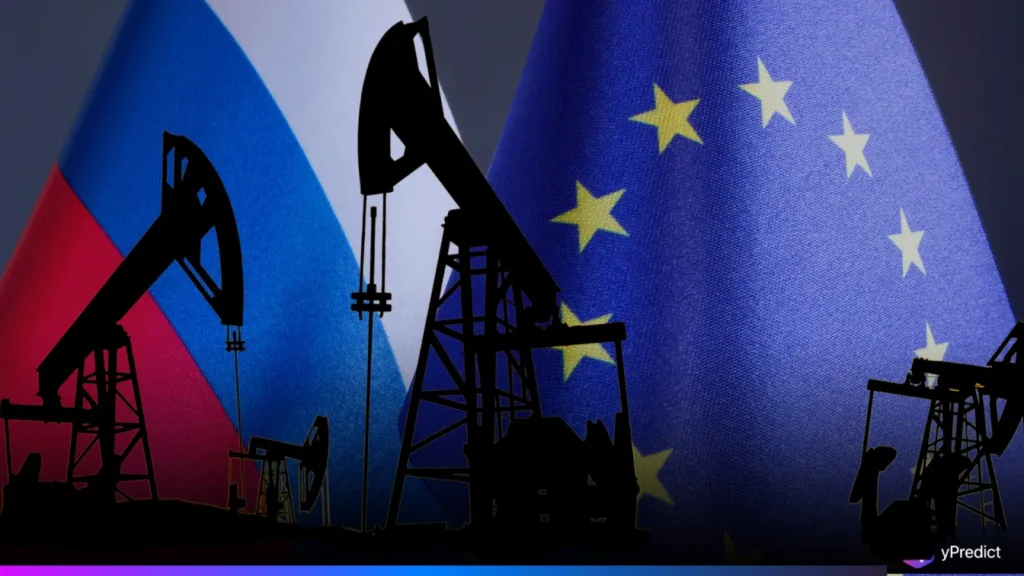
The European Union has moved forward with a new round of EU sanctions aimed at reducing Russia’s oil revenue by lowering the price cap on Russian Urals crude. CNBC reported the development at 08:33 UTC on July 18, 2025. The update builds directly on the G7’s original 2022 price cap initiative, which imposed a $60-per-barrel ceiling on Russian oil exports. Although the cap was initially an effective instrument, it proved increasingly ineffective as the price of oil declined and enforcement lagged. The revised action makes the EU’s desire to take action to counter geopolitical and economic realities abundantly clear.
The European Commission, led by Ursula von der Leyen, has now proposed a reduced cap of about $45 per barrel. This strategic move comes at a time when Russian Urals oil continues to trade at discounted prices below the market, and at a time when Moscow continues to face increased pressure with oil as the basis of its economy.
Proposal Rooted in G7 Strategy and Treasury Data
The new sanctions build directly on the G7 oil cap framework first introduced in 2022. That policy was designed to limit Russia’s ability to fund its war efforts without cutting supplies entirely. According to the U.S. Treasury, enforcement of the original cap led to deeper discounts on Russian Urals crude by March 2024, up to $19 per barrel below global benchmarks. This data helped shape the EU’s current stance, with leaders seeking to increase pressure on Moscow without destabilising energy markets.
Von der Leyen’s proposal to lower the price cap aligns with Treasury evidence showing that stricter oversight can drive down revenue without halting flows. The reduced $45 target directly reflects a tactical adjustment as crude prices fell to $59.77 per barrel in April 2025, weakening the impact of the older $60 cap. By acting now, the EU aims to realign the sanctions with real-time price trends and economic leverage.
Falling Oil Prices Undermine Russia’s Revenue
The core motivation behind the new EU sanctions remains Russia’s reliance on oil revenue. In 2021, Moscow generated an estimated $71 billion from oil sales alone, according to European Commission data. With the new cap, Brussels intends to erode this financial base further. Lower prices and tighter caps could compress margins for Russian Urals crude, forcing Moscow to sell at deeper discounts or reduce output.
By linking sanctions with global market dynamics, the EU is targeting the root of Russia’s budget strength. The oil price dip earlier this year, coupled with discounted sales due to the cap, has already weakened Moscow’s earnings. The proposed $45 ceiling could amplify that trend, particularly if buyers outside the EU also align with enforcement standards.
Historical Data Suggests a New Export Decline
The International Energy Agency has tracked the impact of sanctions since the beginning. In September 2022, it was already down by 230,000 bpd in Russian oil to Europe, before sanctions fully kicked in. While this decline in exports will likely be felt immediately based on the new price cap, the potential for further decreases will likely strengthen as new price cap protocols implement further pressures on global trading routes for Russian Urals oil.
With tight enforcement coupled with weak global benchmarks for Urals, it may be difficult for Russia to maintain prior levels. A continued fall in demand for Urals crude, especially with the ca, could mean more pressure, perhaps leading to cuts to state budgets, cuts to public spending, or cuts to reserves. Brussels believes that this even increased economic pressure will help recalibrate balances of geopolitical powers without escalating to militarized responses.
Enforcement Will Decide Long-Term Impact
While the cap reduction sends a strong signal, its actual impact depends on rigorous enforcement. The U.S. Treasury’s earlier data proved that when enforcement tightens, Russian Urals prices fall further. EU leaders are aware that monitoring compliance among shippers, insurers, and ports is critical. Without it, Moscow could reroute oil through third countries or use alternative methods to bypass the cap.
For now, the EU’s policy shift reflects its determination to keep sanctions in line with global conditions and Russian strategy. By undercutting oil revenue through a stricter cap, Brussels hopes to weaken one of Moscow’s most valuable economic pillars.







